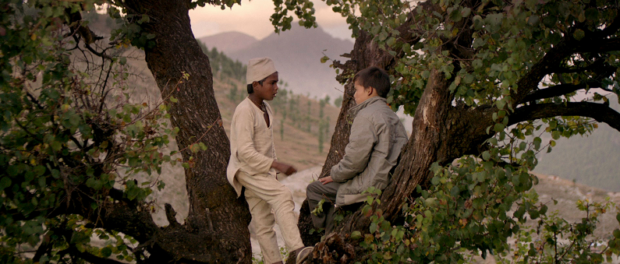Kalo Pothi: Two Boys and a Rooster
Min Bahadur Bham’s Kalo Pothi is a unique film experience. It’s essentially a human story with a fascinating and rarely visible backdrop. We are taken to a mountainous village in Nepal and traverse the ups and downs of village/small town life in the Himalayas. This is sometime in the early 2000s, (2001 given that the Twin Towers attack in NYC is on the news) and the king is expected in the village in the coming days. There is a chatter among the people to get their roosters ready to show to the king and fetch a good price for them. The news on the radio speaks to the failed negotiations between the Maoists and the government.
Nepal (and large parts of South Asia) have been affected by Maoists/Naxalite movements for decades. Kalo Pothi exists in the shadow of the Maoist movement. Villagers attend speeches and public events organized by the revolutionary army. This is where the recruitments happen. Their soldiers partake in village festivities and in addition to political rhetoric, they target recruits early.
The story revolves around two friends, Kiran (Sukra Raj Rokaya) and Prakash (Khadka Raj Nepali). Prakash comes upon a rooster and it becomes his prized possession. He names it Karishma (after the famed Bollywood actor). At the same time his sister Binjul leaves home to join the Maoists. Prakash’s father reprimands him for wasting money on a rooster, as the family struggles with being branded the family of a renegade, a law breaker. Prakash’s father goes out and sells the rooster for Rs. 600 to a man named Tenzing from a neighbouring village. This sets off a whole chain of events as Prakash and Kiran try to organize the repayment needed to get the rooster back.

Kalo Pothi.
As the two struggle to come up with the Rs. 600, they finally decide to take things into their own hands and steal the bird and paint it black. Bham’s raw poetry sweeps every frame of the film, and the authenticity of what his eye captures in the landscape that is rural Nepal is both stunning and profoundly affecting.
From truths of political (armed) protests and conflict, rural living, cultural vibrancy and a world that exists as wholly as any of ours, thousands of miles away, Kalo Pothi is one of the best cinematic experiences I have had in the recent past. As the film moves to its seeming conclusion, Kiran and Prakash fall victim to their own actions and the humanity of the story must find a new meaning to the ownership of a bird, as someone’s raison d’être.
Kalo Pothi is now playing at Cinema Beaubien in its original Nepalese version with French sub-titles.






